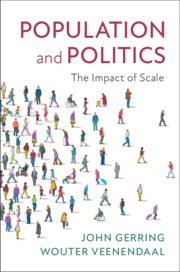16 - How Scale Matters
from Part III - Conclusions
Published online by Cambridge University Press: 14 May 2020
Summary
This concluding chapter pulls together the material of this book into a more synoptic account. We begin by clarifying the aims of our book, highlighting that our approach poses steep challenges but also offers important payoffs. We proceed by summarizing the findings presented in previous chapters, discussing the causality of scale effects and the dimensions along which scale matters. We then offer a tentative theoretical synthesis that ties together many of the themes introduced in previous chapters. Next, we evaluate the implications of scale for big topics like governance, democracy, and freedom, where we identify a series of recalcitrant trade-offs. These concern efficiency (preferences versus policies), political relationships (informal/personal versus formal/institutional), systems of rule (intensive versus extensive), models of popular rule (participatory versus competitive), power (individual versus collective), and freedom (where trade-offs are conditional on structural features of the landscape). In the final section, we discuss the relevance of scale for current policy debates, looking specifically at the effect of boundaries between polities, changes in electoral laws, levels of government in a polity, and suffrage rights.
Keywords
- Type
- Chapter
- Information
- Population and PoliticsThe Impact of Scale, pp. 365 - 392Publisher: Cambridge University PressPrint publication year: 2020

